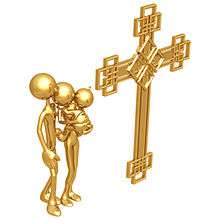It would seem inevitable that we must repudiate one of the two, either Christianity with its love of God and one's neighbor, or the State with its armies and wars. ~ Leo Tolstoy

A state of perfection is a state where there is no power of man over man, that is to say, anarchy. The Kingdom of God is freedom and the absence of such power. ... The Kingdom of God is anarchy. ~ Nikolai Berdyaev

Jesus wanted to liberate everyone from the law — from all laws. But this could not be achieved by abolishing or changing the law. He had to dethrone the law. He had to ensure that the law be man’s servant and not his master. ~ Albert Nolan
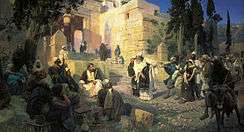
When holy scripture speaks of following Jesus, it proclaims that people are free from all human rules. ~ Dietrich Bonhoeffer
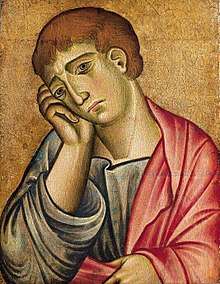
The ruler of this world has been condemned. ~ John the Evangelist

Jesus Christ was the supreme example of authentic anarchy — the creative non-violent anarchist par excellence — working not from the top down, but from the bottom up with the poor, and the poorest of the poor, to empower people and enable them to realize their potential, as men and women made in the images of God. ~ Dave Andrews

For Christian anarchists...the goal of anarchy is "theonomy" — the rule, the ordering, the arky of God. ~ Vernard Eller
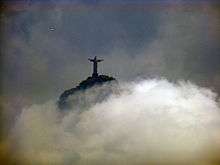
A Christian anarchist is … one who turns the other cheek, overturns the tables of the moneychangers, and does not need a cop to tell him how to behave. A Christian anarchist does not depend upon bullets or ballots to achieve his ideal; he achieves that ideal daily by the One-Man Revolution with which he faces a decadent, confused, and dying world. ~ Ammon Hennacy
_-_Compassion_(1897).jpg)
All good men are Anarchists. All cultured, kindly men; all gentlemen; all just men are Anarchists. Jesus was an Anarchist. ~ Elbert Hubbard

Jesus was an anarchist savior. That's what the Gospels tell us. ~ Ivan Illich
The spread of the peaceful principles of the Savior, will draw men out of the kingdoms of earth into the kingdom of God. ~ David Lipscomb

Jesus, in some respects, was an anarchist … A great social revolution, in which rank will be overturned, in which all authority in this world will be humiliated, was his dream. ~ Ernest Renan
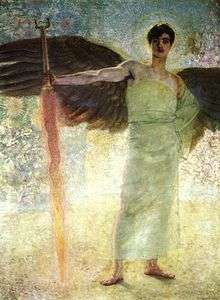
I have now understood that though it seems to men that they live by care for themselves, in truth it is love alone by which they live. ~ Leo Tolstoy

There can be only one permanent revolution — a moral one; the regeneration of the inner man. ~ Leo Tolstoy
_-_James_Tissot_-_overall.jpg)
To want to impose an imaginary state of government on others by violence is not only a vulgar superstition, but even a criminal work. Understand that this work, far from assuring the well-being of humanity is only a lie, a more or less unconscious hypocrisy, camouflaging the lowest passions we posses. ~ Leo Tolstoy
Christian anarchism is a movement in political theology that claims anarchism is inherent in Christianity and the Gospels.
A
- Anarchism…rests upon the doctrine that no man has a right to control by force the action of any other man.
Anarchism is defended on historic grounds: the evils are recited which have been wrought in human history by the employment of force compelling obedience by one will to another will, as they are seen in political and religious despotism, in the subjugation of women, in every form of brigandage from that of the Italian bands to that of the Napoleonic armies. It is conceded that evils might grow out of the abolition of all government; but it is insisted that they would be insignificant in comparison with the wrongs which have been perpetrated on mankind by the authority of government. Anarchism is defended on religious grounds. Jesus Christ is cited as the first of anarchists; for did he not say, "Resist not evil: if one take away thy coat, give him thy cloak also; and if one smite thee upon the one cheek, turn to him the other also?" What is this, we are asked, but a denial of the right to use force even in defense of one's simplest and plainest rights?- Lyman Abbott, "The Cause and Cure of Anarchism" in The Outlook, Volume 70 (February 1902)
- Jesus Christ was the supreme example of authentic anarchy — the creative non-violent anarchist par excellence — working not from the top down, but from the bottom up with the poor, and the poorest of the poor, to empower people and enable them to realize their potential, as men and women made in the image of God.
- Dave Andrews, in Christi-Anarchy: Discovering A Radical Spirituality of Compassion (1999), p. 73
B
- Given that only the religion of pervasive kenosis can be truly universal, no single historical individual can exhaust its fullness by virtue of his redemptive acts, and no religious institution can grasp and articulate its meaning by means of dogmatic or doctrinal teachings. In the last resort, it is in the name of religious universalism that Simone Weil calls for a reversion of historical Christianity to its origins as a religion of kenosis.
- J. Edgar Bauer, in "Simone Weil: Kenotic Thought and "Sainteté Nouvelle" in The 2002 CESNUR International Conference : Minority Religions, Social Change, and Freedom of Conscience (June 2002)
- It is beyond dispute that the state exercises very great power over human life and it always shows a tendency to go beyond the limits laid down for it.
- Nikolai Berdyaev, in Slavery and Freedom (1939), p. 145
- There is absolute truth in anarchism and it is to be seen in its attitude to the sovereignty of the state and to every form of state absolutism. … The religious truth of anarchism consists in this, that power over man is bound up with sin and evil, that a state of perfection is a state where there is no power of man over man, that is to say, anarchy. The Kingdom of God is freedom and the absence of such power... the Kingdom of God is anarchy.
- Nikolai Berdyaev, Slavery and Freedom (1939), p. 147
- The church is a major bureaucracy, and major bureaucracies are disobedient to the gospel.
- Philip Berrigan, in Fighting the Lamb's War: Skirmishes with the American Empire (1996), p. 38
- The Biblical view of the law, the courts, and the state is profoundly radical. The Bible looks upon the state as a kind of rebellious artifice; it is spurious, a human creation in rebellion against God.
In the Old Testament, when the first state is proposed in the person of Saul, the first King of Israel, God tells the prophet Samuel that this project spells rejection of God. The state and its legislature are in rebellion against, or rejection of, God. Its courts are a human fabrication, cannot promote justice and peace; they are founded in violence, and legalize violence.
The state holds together through police power, against the citizenry.
The state, conceived in violence, and backed by violence, will never achieve true peace.- Philip Berrigan, in Fighting the Lamb's War: Skirmishes with the American Empire (1996), p. 202
- According to a University of South Carolina study, violence in America rose 42 percent during the Vietnam War. This is hardly surprising. Our leaders are lawless, so why not we? If the government threatens other countries with the bomb, why not threaten one another with handguns? If our leaders are raping the planet, why not our neighbors? Our leaders create a climate of fear and violence. Why do they appear shocked when Americans kill, rob, and maim one another?
- Philip Berrigan, in Fighting the Lamb's War: Skirmishes with the American Empire (1996), p. 217
- If there ever was an anarchist on Earth the gospel Jesus was one.
- Frank S. Billings, How Shall the Rich Escape? (1894), p. 54
- The Gospel is concerned with the kingdom of God and only with the kingdom of God. The kingdom cannot, therefore, be equated with any human archy, be that archy left wing or right wing, liberal or conservative, revolutionary or anti-revolutionary, Roman Catholic, Orthodox, or Protestant. The Archy of God is intent on reconciling adversaries instead of creating them.
- David Alan Black, Christian Archy (2009), p. 5
- The vision of Christ that thou dost see is my vision’s greatest enemy.
Both read the Bible day and night, but thou read’st black where I read white.
His seventy disciples sent against religion and government.- William Blake, The Everlasting Gospel (c.1818)
- Should the church be trying to erect a spiritual reign of terror over people by threatening earthly and eternal punishment on its own authority and commanding everything a person must believe and do to be saved? Should the church's word bring new tyranny and violent abuse to human souls? It may be that some people yearn for such servitude. But could the church ever serve such a longing?
When holy scripture speaks of following Jesus, it proclaims that people are free from all human rules, from everything which presumes, burdens, or causes worry and torment of conscience. In following Jesus, people are released from the hard yoke of their own laws to be under the gentle yoke of Jesus Christ. … Jesus' commandment never wishes to destroy life, but rather to preserve, strengthen, and heal life.- Dietrich Bonhoeffer, in Discipleship (1937), "Preface", as translated by Barbara Green and Reihhard Krauss (2001)
C
- He who obeys God needs no other authority.
- Petr Chelčický, in The Net of Faith, (c.1443)
- True Christians love God and their neighbors as themselves; they commit no evil by the grace of God. It is not necessary to compel them to goodness since they know better what is good than the law imposing authority.
- Petr Chelčický, Net of Faith (1443), E. Molnár, trans. (1947), Chapter 95
- Let us remain together a little, we who have loved each other so sadly, and have fought so long. I seem to remember only centuries of heroic war, in which you were always heroes — epic on epic, iliad on iliad, and you always brothers in arms. Whether it was but recently (for time is nothing), or at the beginning of the world, I sent you out to war. I sat in the darkness, where there is not any created thing, and to you I was only a voice commanding valour and an unnatural virtue. You heard the voice in the dark, and you never heard it again. The sun in heaven denied it, the earth and sky denied it, all human wisdom denied it. And when I met you in the daylight I denied it myself.
- G. K. Chesterton, in The Man Who Was Thursday (1908), Ch. XV : The Accuser, Sunday (God) speaking to the anarchist circle.
- He had turned his eyes so as to see suddenly the great face of Sunday, which wore a strange smile.
"Have you," he cried in a dreadful voice, "have you ever suffered?"
As he gazed, the great face grew to an awful size, grew larger than the colossal mask of Memnon, which had made him scream as a child. It grew larger and larger, filling the whole sky; then everything went black. Only in the blackness before it entirely destroyed his brain he seemed to hear a distant voice saying a commonplace text that he had heard somewhere, "Can ye drink of the cup that I drink of?"- G. K. Chesterton, in The Man Who Was Thursday (1908), Ch. XV : The Accuser, God's final revelations of his part as the creator of the anarchist societies.
- But the truth is that it is only by believing in God that we can ever criticise the Government. Once abolish the God, and the Government becomes the God.
- G. K. Chesterton, in Christendom in Dublin (1932), Ch. III: Very Christian Democracy.
- Christian anarchism does share a lot with Christian pacifism, but it goes further, especially by carrying this pacifism forward as implying a critique of the violent state. Christian anarchism also shares a lot with liberation theology especially its insistence that Christianity does have very real political implications. But Christian anarchism is critical of liberation theology's emphasis on human agency, of its compromise with violence, and its lack of New Testament references compared to Christian anarchism. In short, while related to at least two important trends within Christian political thinking, Christian anarchism is more radical than both, and thus provides a unique contribution to Christian political thought. … It is a unique political theology, and a unique political theory
- Alexandre Christoyannopoulos, in Christian Anarchism: A Political Commentary on the Gospel (2010), p. 294
- Rocking the vote may mean going to the booths and writing in our Candidate, because he doesn't seem to be on the ballot.
- Shane Claiborne, in Jesus for President: Politics for Ordinary Radicals (2008), p. 335
D
- There is no greater mindlessness and absurdity than to force conscience and the spirit with external power, when only their creator has authority for them.
- Ferenc Dávid, as quoted in "The Transylvania Journey" by Rev. Michael McGee (25 July 2004), and in Whose God? and Three Related Works (2007) by Benjamin C. Godfrey, p. 61
E
- For Christian anarchists...the goal of anarchy is "theonomy" — the rule, the ordering, the arky of God.
- Jesus asserted that each person could have direct and personal access to the truth, and each become in effect his or her own authority.
- Michael C. Elliot, in Freedom, Justice and Christian Counter-Culture (1990), p. 164
- My aim is not the establishment of an anarchist society or the total destruction of the state. Here I differ from anarchists. I do not believe that it is possible to destroy the modern state. It is pure imagination to think that some day this power will be overthrown. From a pragmatic standpoint there is no chance of success. Furthermore, I do not believe that anarchist doctrine is the solution to the problem of organization in society and government. I do not think that if anarchism were to succeed we should have a better or more livable society. Hence I am not fighting for the triumph of this doctrine.
- Jacques Ellul, The Ethics of Freedom (1973 - 1974), p. 396
- There are different forms of anarchy and different currents in it. I must, first say very simply what anarchy I have in view. By anarchy I mean first an absolute rejection of violence.
- Jacques Ellul, in Anarchy and Christianity (1988), p. 11
- What seems to be one of the disasters of our time is that we all appear to agree that the nation-state is the norm. … Whether the state be Marxist or capitalist, it makes no difference. The dominant ideology is that of sovereignty.
- Jacques Ellul, in Anarchy and Christianity (1988), p. 104
- So I can very well say without hesitation that all those who have political power, even if they use it well have acquired it by demonic mediation and even if they are not conscious of it, they are worshippers of diabolos.
- Jacques Ellul, in Si tu es le Fils de Dieu (1991), p. 76
- Anarchism can teach Christian thinkers to see the realities of our societies from a different standpoint than the dominant one of the state. What seems to be one of the disasters of our time is that we all appear to agree that the nation-state is the norm. … Whether the state be Marxist or capitalist, it makes no difference. The dominant ideology is that of sovereignty.
- Jacques Ellul, Anarchy and Christianity [Anarchie et Christianisme] (1988) as translated by Geoffrey W. Bromiley (1991), pp.104–5
H
- Christian anarchism is based upon the answer of Jesus to the Pharisees, when He said that he without sin should be the first to cast the stone, and upon the Sermon on the Mount, which advises the return of good for evil and the turning of the other cheek. Therefore, when we take any part in government by voting for legislative, judicial, and executive officials, we make these men our arm by which we cast a stone and deny the Sermon on the Mount.
The dictionary definition of a Christian is one who follows Christ; kind, kindly, Christ-like. Anarchism is voluntary cooperation for good, with the right of secession. A Christian anarchist is therefore one who turns the other cheek, overturns the tables of the moneychangers, and does not need a cop to tell him how to behave. A Christian anarchist does not depend upon bullets or ballots to achieve his ideal; he achieves that ideal daily by the One-Man Revolution with which he faces a decadent, confused, and dying world.- Ammon Hennacy, "Christian Anarchism" in The Book of Ammon (1965)
- An anarchist is someone who doesn't need a cop to make him behave. Anarchism is voluntary cooperation with the right of secession. The individual or the family or the small group as a unit instead of the State.
- Ammon Hennacy, in The Book of Ammon (1965), p. 31
- Oh judge! Your damn laws! The good people don't need them, and the bad people don't obey them.
- Ammon Hennacy, as quoted in Voices from the Catholic Worker (1993) edited by Rosalie Riegle Troester, p. 114
- I am an Anarchist. All good men are Anarchists. All cultured, kindly men; all gentlemen; all just men are Anarchists. Jesus was an Anarchist.
- Elbert Hubbard, in A Message to Garcia and Thirteen Other Things (1901), p. 147
I
- Jesus was an anarchist savior. That's what the Gospels tell us.
J
- νῦν ὁ ἄρχων τοῦ κόσμου τούτου ἐκβληθήσεται ἔξω.
- ὁ τοῦ κόσμου ἄρχων ... ἐν ἐμοὶ οὐκ ἔχει οὐδέν.
L
- The true founder of anarchy was Jesus Christ and…the first anarchist society was that of the apostles.
- Georges Lechartier, as quoted in Anarchism : A History of Libertarian Ideas and Movements (1962) by George Woodcock, Part One : The Idea, Ch. 2 : The Family Tree p. 36
- All the wars and strifes between tribes, races, nations, from the beginning until now, have been the result of man's effort to govern himself and the world, rather than to submit to the government of God.
- God has always kept on earth a government of his own…In Eden the government was direct, individual and personal. God spoke directly to man and gave specific commands to be obeyed.
- David Lipscomb, in Civil Government : Its Origin, Mission, and Destiny, and the Christian's Relation To It (1889), p. 12
- Every one who honors and serves the human government and relies upon it, for good, more than he does upon the Divine government, worships and serves the creature more than he does the Creator.
- David Lipscomb, in Civil Government : Its Origin, Mission, and Destiny, and the Christian's Relation To It (1889), p. 49
- Human government, the embodied effort of man to rule the world without God, ruled over by "the prince of this world," the devil. Its mission is to execute wrath and vengeance here on earth. Human government bears the same relation to hell as the church bears to heaven.
- David Lipscomb, in Civil Government : Its Origin, Mission, and Destiny, and the Christian's Relation To It (1889), p. 73
- It is the duty of the Christian to submit to the human government in its office and work and to seek its destruction only by spreading the religion of Christ and so converting men from service to the earthly government to service to the heavenly one, and so, too, by removing the necessity for its existence and work. No violence, no sword, no bitterness or wrath can he use. The spread of the peaceful principles of the Savior, will draw men out of the kingdoms of earth into the kingdom of God.
- David Lipscomb, in Civil Government : Its Origin, Mission, and Destiny, and the Christian's Relation To It (1889), p. 87
M
- οἴδατε ὅτι οἱ ἄρχοντες τῶν ἐθνῶν κατακυριεύουσιν αὐτῶν καὶ οἱ μεγάλοι κατεξουσιάζουσιν αὐτῶν. οὐχ οὕτως ἐστὶν ἐν ὑμῖν.
- The Roman government called the Christians enemies of the state. They would not serve in the Roman army. They refused to salute the emperor’s statue, which meant the same to Roman society that a nation’s flag does to citizens today. They were loyal only to their religion.
- Edith McCall, Evalyn Rapparlie and Jack Spatafora, Man—His World and Cultures (1974), p. 67, 68
N
- I began my political responsibility as an ultra-conservative. I wanted the Kaiser to come back; and now I am a revolutionary. I really mean that. If I live to be a hundred I shall maybe be an anarchist, for an anarchist wants to do without all government.
- Martin Niemöller, as quoted in Martin Niemöller, 1892-1984 (1984) by James Bentley, p. 223
- The phenomenon is of the first order of importance: the small insurrectionary movement which took the name of Jesus of Nazareth is simply the Jewish instinct redivivus — in other words, it is the priestly instinct come to such a pass that it can no longer endure the priest as a fact. … Christianity actually denies the church.
It was an insurrection…against the whole hierarchy of society — not against corruption but against caste, privilege, order, formalism. It was an unbelief in "superior men," a Nay flung at everything priests and theologians stood for. … This saintly anarchist, who aroused the people of the abyss, the outcasts and "sinners," the Chandala of Judaism, to rise in revolt against the established order of things — and in language which, if the Gospels are to be credited, would get him sent to Siberia today — this man was certainly a political criminal, at least in so far as it was possible to be one in so absurdly unpolitical a community. This is what brought him to the cross: the proof thereof is to be found in the inscription that was put upon the cross.- Friedrich Nietzsche, The Antichrist, Sec. 27
- Jesus wanted to liberate everyone from the law — from all laws. But this could not be achieved by abolishing or changing the law. He had to dethrone the law. He had to ensure that the law be man’s servant and not his master (Mark 2:27-28). Man must therefore take responsibility for his servant, the law, and use it to serve the needs of mankind.
- Albert Nolan, in Jesus Before Christianity: The Gospel of Liberation (1976), p. 72
- Anarchism is in reality the ideal of political and social science, and also the ideal of religion. It is the ideal to which Jesus Christ looked forward. Christ founded no church, established no state, gave practically no laws, organized no government and set up no external authority, but he did seek to write on the hearts of men God's law and make them self-legislating.
- Heber Newton, in Free Speech for Radicals (1916) by Theodore Schroeder, p. 7
O
- Jesus … is the final priest who makes all priesthood obsolete – not merely the performance of ritual sacrifice, but the office, pomp and circumstance of priestly authority and hierarchy itself. Instead of deferring to any caste of religious hierarchs, followers of the Way are thus now summoned to collectively be a "royal priesthood," a "chosen race" or "holy nation" built not upon offices of any kind but upon transferred allegiance to God's in-breaking "kingdom."
- Ronald E. Osborn, Anarchy and Apocalypse: Essays on Faith, Violence, and Theodicy (2010), pp.35-36
P
- Μηδενὶ μηδὲν ὀφείλετε, εἰ μὴ τὸ ἀλλήλους ἀγαπᾶν· ὁ γὰρ ἀγαπῶν τὸν ἕτερον νόμον πεπλήρωκεν.
- Owe no man any thing, but to love one another: for he that loveth another hath fulfilled the law.
- Paul of Tarsus, Romans 13:8 KJV
- The rulers of this age, who are coming to nothing.
R
- It is correctly asserted that the apostles undertook no social propaganda. Paul held no antislavery meetings, and Peter made no public protest against the organized grafting in the Roman system of tax-farming. Of course they did not. Even the most ardent Christian socialist of our day would have stepped softly if he had been in their place. The right of public agitation was very limited in the Roman Empire. Any attempt to arouse the people against the oppression of the government or the special privileges of the possessing classes, would have been choked off with relentless promptness. ... Society was tensely alert against any possible slave rising. If a slave killed his master, the law provided that every slave of that household should be killed, even if there was no trace of complicity. Upper-class philosophers might permit themselves very noble and liberal sentiments only because there was no connection between them and the masses, and their sentiments ended in perfumed smoke.
Under such circumstances any prudent man will husband his chances of life and usefulness, and drop the seeds of truth warily. If the convictions of William Lloyd Garrison had burned in Paul, we should probably not know that Paul had ever existed. There is no parallel between such a situation and our own in a country where we are ourselves the citizen kings, and where the right of moral agitation is almost unlimited.
- Walter Rauschenbusch, Christianity and the Social Crisis (1913), p. 152
- He declared that in the present world evil is the reigning power. Satan is "the prince of this world," and everything obeys him. The kings kill the prophets. The priests and the doctors do not that which they command others to do; the righteous are persecuted, and the only portion of the good is weeping. The "world" is in this manner the enemy of God and his saints; but God will awaken and avenge his saints. The day is at hand, for the abomination is at its height. The reign of goodness will have its turn.
The advent of this reign of goodness will be a great and sudden revolution. The world will seem to be turned upside down: the actual state being bad, in order to represent the future, it suffices to conceive nearly the reverse of that which exists. The first shall be last. A new order shall govern humanity.
Jesus, in some respects, was an anarchist, for he had no idea of civil government. That government seems to him purely and simply an abuse.
A great social revolution, in which rank will be overturned, in which all authority in this world will be humiliated, was his dream.- Ernest Renan, in The Life of Jesus (1863), Ch. XII: Development of the ideas of Jesus respecting the Kingdom of God
T
- The order of authority derives from God, as the Apostle says [in Romans 13:1-7]. For this reason, the duty of obedience is, for the Christian, a consequence of this derivation of authority from God, and ceases when that ceases. But, as we have already said, authority may fail to derive from God for two reasons: either because of the way in which authority has been obtained, or in consequence of the use which is made of it.
- Thomas Aquinas, Commentary on the Sentences of Peter Lombard
- All men live not by the thought they spend on their own welfare, but because love exists in man.
I knew before that God gave life to men and desires that they should live; now I understood more than that.
I understood that God does not wish men to live apart, and therefore he does not reveal to them what each one needs for himself; but he wishes them to live united, and therefore reveals to each of them what is necessary for all.
I have now understood that though it seems to men that they live by care for themselves, in truth it is love alone by which they live. He who has love, is in God, and God is in him, for God is love.- Leo Tolstoy, in What Men Live By (1881), Ch. XII
- The sanctification of political power by Christianity is blasphemy; it is the negation of Christianity.
- Leo Tolstoy, Church and State (1882)
- Christ says, "Do not resist evil." The sole object of courts of law is – to resist evil. Christ enjoins us to return good for evil. Courts of law return evil for evil. Christ says, "Make no distinction between the just and the unjust." Courts of law do nothing else. Christ says, "Forgive all. Forgive not once, not seven times, but forgive without end." "Love your enemies." "Do good to those who hate you." Courts of law do not forgive, but they punish; they do not do good, but evil, to those whom they call the enemies of society. So, the true sense of the doctrine is that Christ forbids all courts of law.
- Leo Tolstoy, What I Believe (1885), Ch. III
- For a Christian the oath of allegiance to any government whatever — the very act which is regarded as the foundation of the existence of a state — is a direct renunciation of Christianity. For the man who promises unconditional obedience in the future to laws, made or to be made, by that very promise is in the most, positive manner renouncing Christianity, which means obeying in every circumstance of life only the divine law of love he recognizes within him.
- Leo Tolstoy, in The Kingdom of God is Within You (1894), Ch. IX
- Christianity in its true sense puts an end to government. So it was understood at its very commencement; it was for that cause that Christ was crucified. So it has always been understood by people who were not under the necessity of justifying a Christian government. Only from the time that the heads of government assumed an external and nominal Christianity, men began to invent all the impossible, cunningly devised theories by means of which Christianity can be reconciled with government. But no honest and serious-minded man of our day can help seeing the incompatibility of true Christianity — the doctrine of meekness, forgiveness of injuries, and love — with government, with its pomp, acts of violence, executions, and wars. The profession of true Christianity not only excludes the possibility of recognizing government, but even destroys its very foundations.
- Leo Tolstoy, in The Kingdom of God is Within You (1894), Ch. X
- In all history there is no war which was not hatched by the governments, the governments alone, independent of the interests of the people, to whom war is always pernicious even when successful.
The government assures the people that they are in danger from the invasion of another nation, or from foes in their midst, and that the only way to escape this danger is by the slavish obedience of the people to their government. This fact is seen most prominently during revolutions and dictatorships, but it exists always and everywhere that the power of the government exists. Every government explains its existence, and justifies its deeds of violence, by the argument that if it did not exist the condition of things would be very much worse. After assuring the people of its danger the government subordinates it to control, and when in this condition compels it to attack some other nation. And thus the assurance of the government is corroborated in the eyes of the people, as to the danger of attack from other nations.- Leo Tolstoy, in Christianity and Patriotism (1895), as translated in The Novels and Other Works of Lyof N. Tolstoï, Vol. 20, p. 44
- Government is violence, Christianity is meekness, non-resistance, love. And, therefore, government cannot be Christian, and a man who wishes to be a Christian must not serve government.
- The Anarchists are right in everything; in the negation of the existing order, and in the assertion that, without authority, there could not be worse violence than that of authority under existing conditions. They are mistaken only in thinking that Anarchy can be instituted by a revolution. "To establish Anarchy." "Anarchy will be instituted." But it will be instituted only by there being more and more people who do not require protection from governmental power, and by there being more and more people who will be ashamed of applying this power.
- Leo Tolstoy, "On Anarchy", in Pamphlets : Translated from the Russian (1900) as translated by Aylmer Maude, p. 22
- If only each King, Emperor, and President understood that his work of directing armies is not an honourable and important duty, as his flatterers persuade him it is, but a bad and shameful act of preparation for murder — and if each private individual understood that the payment of taxes wherewith to hire and equip soldiers, and, above all, army-service itself, are not matters of indifference, but are bad and shameful actions by which he not only permits but participates in murder — then this power of Emperors, Kings, and Presidents, which now arouses our indignation, and which causes them to be murdered, would disappear of itself.
- Leo Tolstoy, Thou Shalt Not Kill (1900)
- There can be only one permanent revolution — a moral one; the regeneration of the inner man.
How is this revolution to take place? Nobody knows how it will take place in humanity, but every man feels it clearly in himself. And yet in our world everybody thinks of changing humanity, and nobody thinks of changing himself.- Leo Tolstoy, "Three Methods Of Reform" in Pamphlets : Translated from the Russian (1900) as translated by Aylmer Maude, p. 29
- Variant: Everyone thinks of changing the world, but no one thinks of changing himself.
- As quoted in The Artist's Way at Work : Riding the Dragon (1999) by Mark A. Bryan with Julia Cameron and Catherine A. Allen, p. 160
- Not only does the action of Governments not deter men from crimes; on the contrary, it increases crime by always disturbing and lowering the moral standard of society. Nor can this be otherwise, since always and everywhere a Government, by its very nature, must put in the place of the highest, eternal, religious law (not written in books but in the hearts of men, and binding on every one) its own unjust, man-made laws, the object of which is neither justice nor the common good of all but various considerations of home and foreign expediency.
- Leo Tolstoy, in The Meaning of the Russian Revolution (1906) a work about the 1905 Russian Revolution.
- Understand then all of you, especially the young, that to want to impose an imaginary state of government on others by violence is not only a vulgar superstition, but even a criminal work. Understand that this work, far from assuring the well-being of humanity is only a lie, a more or less unconscious hypocrisy, camouflaging the lowest passions we possess.
- Leo Tolstoy, passage written for for The Law of Love and the Law of Violence (1908), released in 1917, as quoted in Equality in Liberty and Justice (2001) by Antony Flew, p. 89
- It would seem inevitable that we must repudiate one of the two, either Christianity with its love of God and one's neighbor, or the State with its armies and wars. Perhaps Christianity may be obsolete, and when choosing between the two — Christianity and love of the State and murder — the people of our time will conclude that the existence of the State and murder is more important than Christianity. Perhaps we must forgo Christianity and retain only what is important: the State and murder.
That may be so — at least people may think and feel so. But in that case they should say so! They should openly admit that people in our time have ceased to believe in what the collective wisdom of mankind has said, and what is said by the Law of God they profess: have ceased to believe in what is written indelibly on the heart of each man, and must now believe only in what is ordered by various people who by accident or birth have happened to become emperors and kings, or by various intrigues and elections have become presidents or members of senates and parliaments — even if those orders include murder. That is what they ought to say!
But it is impossible to say it; and yet one of these two things has to be said. If it is admitted that Christianity forbids murder, both armies and governments become impossible. And if it is admitted that government acknowledges the lawfulness of murder and denies Christianity, no one will wish to obey a government that exists merely by its power to kill.- Leo Tolstoy, Last Message to Mankind (1909)
Y
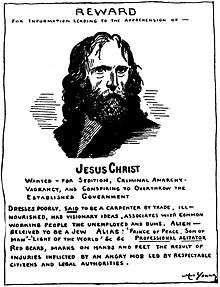
Jesus Christ : Wanted — For Sedition, Criminal Anarchy — Vagrancy, and Conspiring to Overthrow the Established Government. ~ Art Young
- Christian anarchism is not a revolutionary politic for it denies the legitimacy of revolution. This is a call for something far more subversive than the replacing of one regime with another. Regime change has been the model of worldly power since its inception. Instead, Christian anarchism rejects the very presuppositions that make the idea of revolution, and, perhaps, even liberation itself, intelligible. Jesus is neither exemplified in Che Guevara or Simon the Zealot. He had no desire to destroy or replace the kingdoms that surrounded him with a different ruler; instead, he established a community of believers who developed and reside in the altera civitas on earth: the church.
- Tripp York, in Living on Hope While Living in Babylon: The Christian Anarchists of the 20th Century (2009), p. 30
- Reward for information leading to the apprehension of —
Jesus Christ
Wanted — For Sedition, Criminal Anarchy — Vagrancy, and Conspiring to Overthrow the Established Government.
Dresses poorly, said to be a carpenter by trade, ill-nourished, has visionary ideas, associates with common working people, the unemployed and bums. Alien — believed to be a Jew. Alias: "Prince of Peace. Son of Man." "Light of the world" &c. &c. Professional Agitator, Red beard, marks on hands and feet the result of injuries inflicted by an angry mob led by respectable citizens and legal authorities.- Art Young, Jesus Christ "wanted-poster" political cartoon in The Masses (1917)
See also
External links
- Jesus Radicals
- Chrisitan Anarchy
- The Christian Anarchist
- Christian "Anarchism" In a Nutshell
- Christian Anarchism: A Revolutionary Reading of the Bible, by Alexandre Christoyannopoulos, World International Studies Conference (23–26 July 2008)
- Jesus Is an Anarchist by James Redford, Social Science Research Network (17 October 2009)
- "Christian Anarchist": An Oxymoron? by Jim Davies
- "Was Jesus an anarchist?"- interview with Alexandre Christoyannopoulos by William Crawley, BBC (May 2011)
- "Union Square Speech" by Dorothy Day (6 November 1965)
This article is issued from
Wikiquote.
The text is licensed under Creative
Commons - Attribution - Sharealike.
Additional terms may apply for the media files.

